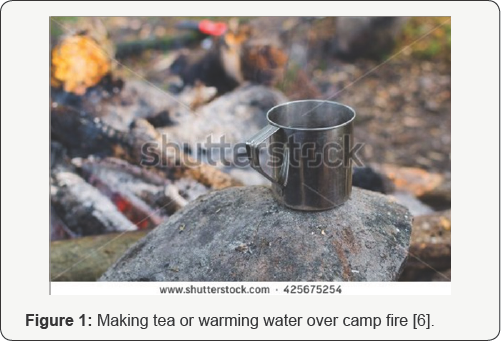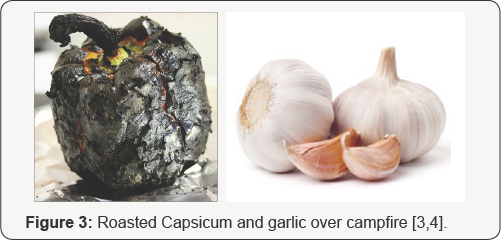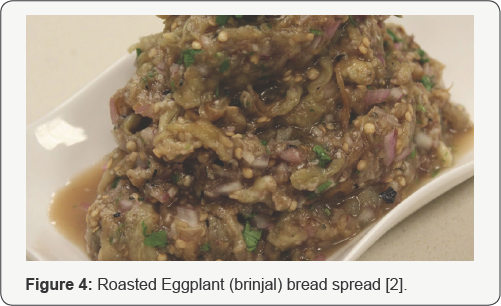Outdoor Cooking during Camping to make a Good Sumptuous Meal
J S Ghosh*
Department of Biotechnology, Smt. K. W. College, India
Submission: January 25, 2017; Published: February 01, 2017
*Corresponding author: J S Ghosh, Department of Biotechnology, Smt KW College, Sangli, India, Tel: +919850515620; Email: ghoshjai@gmail.com
How to cite this article: J S Ghosh. Outdoor Cooking during Camping to make a Good Sumptuous Meal. Nutri Food Sci Int J. 2017; 2(3): 555587. DOI:10.19080/NFSIJ.MS.ID.555587
Introduction
Camping is not something new to many adventurists. However, there are several things that have to be considered during this period. The importance of the itinerary becomes more important when one is taking rest during the night. One of the most important thing is safety and mostly from nocturnal animals [1]. Secondly, the supply of good water especially for drinking purposes and lastly the disposal of all waste generated during the camping which includes the burnt out camp fire [2]. (Figure 1) It must be remembered that in natural meadows or forest region, the biodiversity should not be disturbed by any means and therefore, cleanliness is of utmost importance. All these things are known to regular hiker or trekkers or people who like adventure. However, to those who are for the first time trying out some sort of outdoor living, these things must be borne in mind and strictly adhered to. This also hold true when people are forced to outdoor living say by some natural calamity.

Many of these first-timers use a very heavy back pack filled with sufficient cooked foods and things like dry and wet sauces. These are also filled with good supply of drinking water, tea and coffee etc. Inspite of all these, they also try to camp preferably near some human habitation so that they feel secured. It has been observed that when this sort of outdoor living is forced upon due to certain circumstances, one of the major requirements is that of good food. Usually, food supply becomes rare and one needs to cook using the natural resources [3]. What will be abundantly available will be the energy in the form of fire (but without the cooking utensils). Does this mean that the campers must go hungry (inability to cook without utensils, cooking medium, seasonings etc)? No; with a little bit of presence of mind, he or she can cook something good which will provide the minimum nutrition required [4] (Figure 2,3).


Some of this cooking procedure for outdoor living and yet carry a light backpack for the same [4]. If one sees the published diaries of trekkers or hikers especially those who move in forest areas, one would find that non-vegetarian food is usually prepared during night halt. That is because hunting of small animals, birds or fishes during the late hours of evening (which is the twilight zone) can serve as good food to give the necessary proteins and energy during night. This article will highlight how a strict vegetarian person too can have good food before calling off the day. This article is meant for those beginners who like outdoor living for a short period like one night halt. Later on these people will learn from experience how to survive in the open meadows or forest land. Initially, it would be advisable to carry certain vegetables (of course in limited quantity) like a few good egg plants (brinjal), may be some capsicum, some green chili, a few pods of garlic, a couple of medium sized onion, a small salt sprinkler (if required)etc [5,6,7] (Figure 1,4).

Care is to be taken that these do not add to the weight of the back pack in more than 500gms to 700gms. It must be remembered that the only cooking that is possible will be roasting and nothing else. Some bread (may be medium hard) with good shelf life, too would be preferable. A normal metal mug of 500 ml capacity (preferably an iron mug) needed to boil water for drinking purpose or making tea [8]. One may carry a few tea bags, some dry whitener (if required). The most important thing should be a good medium sized sharp enough knives (not the fancy camping knives available in some supermarket), a medium sized plate and a spoon if required. It is pretty sure that all these things would not weigh more than a kilogram. Carrying all these and walking for a few miles would not be too tiresome. Next, important thing is to ensure a safe place to halt for the night [8].
It should be marked during the twilight period. One would need to search for twigs, dead dry tree trunks or thick branches of varied sizes and shapes, some fibrous leaves or creeping plants having sufficient tensile strength, etc [9]. The camping location should be preferably near some (not too close) source of natural clean water. The camp must be securely set up on some fairly flat ground before the sunset. At a suitable distance and at a safe location the woods must be arranged to start the campfire (care should be taken to see that a forest fire is not started). As the sun sets one may bring some water in the mug to heat and prepare tea as per taste [6]. The tea would remove most of the physical and mental tiredness. By this time hot cinders from the campfire would be developing. The egg plants, along with some garlic pods and some capsicum can be carefully roasted in these hot cinders. Alternately, thin twigs can be sharpened with the knife and used as skewers to hold the eggplants, capsicum and garlic pods and roasted directly over the flame of campfires. The roasted vegetable should be carefully skinned after cooling and mashed in a plate/bowl.
To it one can add sliced and pounded raw onion and finely cut green chilies (to taste). Mix all the ingredients while warm to a coarse (lumpy) paste. This will be an excellent bread spread which can be eaten with the bread. Sprinkle some salt on the spread if required. The mug should be cleaned in the water and used for making drinking water (i.e. boiling the water and cooling it). This sort of cooking will produce minimum amount of wastes (may be a handful) which can be easily disposed of by incinerating it in the campfire or by burying it in the ground. Such type of cooking prevent one from carrying and eating canned foods and then having problem of waste disposal for the empty cans, plastic bags or bottles, sheets etc. Finally it should be noted that the campfire should be glowing and cindering throughout the night as it would keep inquisitive nocturnal animals away. The fire should be totally extinguished in the morning before leaving for the next destination. It should be thoroughly doused with water to ensure that nobody (especially animals) do not get hurt due to the fire if they accidentally step on it [10]. Before leaving the ground care should be taken that no traces of camping is left. The site should be cleaned as it was at the beginning of setting the camp.
References
- Schatz John (2001) "Summer Outdoor Safety”. Mobility Forum 10(2): 23.
- http://blog.outdoorherbivore.com/camp-tips/how-to-pick-a-good- campsite/
- https://www.rei.com/learn/expert-advice/campsite-selection.html
- Rittman Allison (2012) "Campfire-Inspired Cooking”. Prepared Foods 181(1): 79-84.
- http://offbeatandinspired.com/2012/09/20/diy-roasted-red- peppers/
- http://firedupfood.com/campfire-roasted-garlic/
- http://toriavey.com/how-to/2011/06/how-to-roast-eggplant/
- www.shutterstock.com 425675254
- http://www.artofmanliness.com/2008/09/04/how-to-build-a- roaring-campfire/
- https://lnt.org/learn/principle-3






























